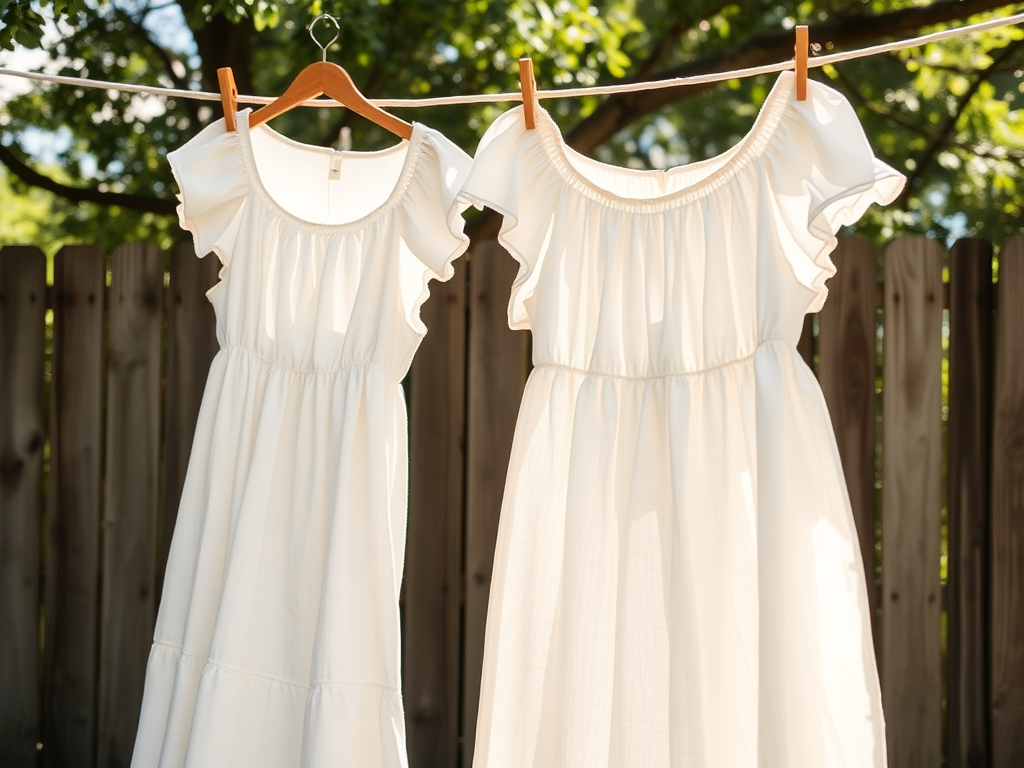As the summer sun begins to shine more brightly, the choice of fabric for women’s summer dresses becomes increasingly significant. The right material can turn a simple dress into a comfortable wardrobe staple, perfect for warm weather outings or leisurely beach days. Two fabrics that reign supreme during the sun-soaked months are cotton and linen. Each has its unique qualities, advantages, and drawbacks that can influence how your dress feels and performs in hot conditions. Navigating through available options can be bewildering, especially when both fabrics offer unmatched benefits. In this article, we’ll delve deep into each fabric to help you make an informed choice when selecting your next summer dress.
Understanding Cotton

Cotton, one of the most popular fabrics throughout history, has been a go-to choice for summer apparel for centuries. Renowned for its soft and breathable characteristics, cotton provides a gentle touch against the skin. It serves as a natural insulator, offering warmth during cooler evenings while remaining light enough for daytime wear. Additionally, cotton’s moisture-wicking properties help absorb sweat, making it a practical choice for humid conditions. Despite its established reputation, it’s essential to explore the full spectrum of cotton fabric’s benefits and limitations when selecting your summer dress.
Pros of Cotton Dresses
- Comfort and softness: Cotton’s natural fibers feel soft against the skin, enhancing comfort levels.
- Versatility in styles and patterns: Cotton is available in various prints and designs, making it suitable for diverse occasions.
- Easy to care for and maintain: Cotton dresses are typically machine washable and resist fading over time.
Cons of Cotton Dresses
- Tendency to wrinkle: Cotton can become creased, making it sometimes appear less polished.
- May retain moisture under high humidity: While breathable, cotton can become damp in extremely humid situations.
Exploring Linen

Linen, crafted from the fibers of the flax plant, boasts a distinctive elegance that sets it apart from other materials. Its natural texture and durability appeal to many fashion enthusiasts, offering a chic aesthetic. The unique moisture-wicking ability of linen means it dries quickly and stays comfortable in warm weather. Throughout history, linen has been celebrated for its cooling properties, making it a favored fabric in various cultures. However, like every fabric, linen comes with its advantages and disadvantages worth considering before making a purchase.
Pros of Linen Dresses
- Remarkable breathability and moisture-wicking ability: Linen allows air circulation, keeping you cool.
- Naturally textured look that enhances elegance: The tailored appearance of linen dresses can elevate your style.
- Long-lasting and eco-friendly: Linen fibers are strong and biodegradable, making them an environmentally sustainable choice.
Cons of Linen Dresses
- Wrinkles easily: While some embrace the look, it can be challenging to keep linen dresses crisp.
- Cost considerations compared to cotton: High-quality linen tends to be pricier than cotton options.
Cotton vs. Linen: Performance in Hot Weather
The performance of cotton and linen dresses in hot weather can significantly differ based on various factors. When temperatures soar, moisture management and breathability become crucial. In general, linen excels due to its open weave, allowing heat to escape while simultaneously absorbing moisture from the body. Cotton, although breathable, is not as effective as linen in extreme humidity, at times feeling heavier and less forgiving. To help you visualize this comparison, refer to the table below:
| Fabric | Breathability | Moisture-wicking | Wrinkle Resistance |
|---|---|---|---|
| Cotton | Good | Moderate | Poor |
| Linen | Excellent | Excellent | Poor |
This table provides a clearer perspective on how each fabric operates under the pressure of summer heat. Linen’s overall superiority in breathability and moisture-wicking positions it as a frontrunner for high temperatures, while cotton still holds its ground for comfort and ease of care.
Style Considerations
When contemplating style, both cotton and linen have strengths that can cater to different tastes and occasions. Cotton dresses are often available in a variety of styles, including casual sundresses to chic shift designs suitable for brunch or casual outings. Their versatility allows for pairing with numerous accessories, enhancing personal expression. Linen, on the other hand, tends to lean more towards sophisticated cuts, often favored for beach weddings or elegant garden parties. A well-designed linen dress can stand alone or be easily elevated with the right statement jewelry.
Care and Maintenance
To prolong the lifespan of your favorite summer dress, understanding the care needed for each fabric is essential. Cotton dresses are generally forgiving when it comes to cleaning; they can withstand regular machine washing, with some fabrics even designed to be wrinkle-resistant. For optimal care, wash in cold water and tumble dry on low. On the flip side, linen requires more attentive maintenance. It benefits from a gentle wash cycle, and air drying is recommended to avoid shrinking or excessive wrinkling. To maintain linen’s integrity, it’s best to avoid using bleach and consider ironing on low heat when needed.
Conclusion
In summation, both cotton and linen bring unique benefits and considerations when it comes to summer dresses. Cotton offers unmatched comfort and easy maintenance, perfect for everyday wear or casual outings. Linen shines in breathability and elegance, ideal for someone looking to make a style statement during hot weather. Ultimately, your choice will depend on personal factors such as comfort preference, care commitment, and specific occasions. Embrace the summer season by selecting a fabric that reflects your style and ensures comfort through the warmest of days.
Frequently Asked Questions
- What is the main difference between cotton and linen? Cotton is soft and smooth, while linen has a more textured feel and is generally cooler to wear.
- Which fabric is more breathable? Linen is considered more breathable than cotton, making it ideal for hot and humid weather.
- Are cotton dresses easier to care for than linen? Yes, cotton dresses are typically easier to wash and maintain compared to linen, which requires more delicate handling.
- Do linen dresses wrinkle easily? Yes, linen fabric is known for its tendency to wrinkle, but many people find its natural look charming.
- Can I wear cotton dresses for special occasions? Absolutely, cotton dresses come in various styles, including elegant designs suitable for special occasions.



